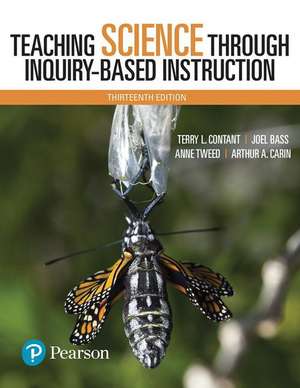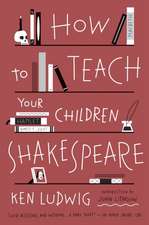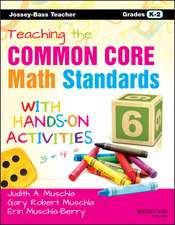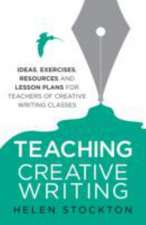Teaching Science Through Inquiry-Based Instruction, with Enhanced Pearson Etext -- Access Card Package
Autor Terry L. Contant, Joel E. Bass, Arthur A. Carinen Limba Engleză Mixed media product
- Engaging. The new interactive, multimedia learning features were developed by the authors and other subject-matter experts to deepen and enrich the learning experience.
- Convenient. Enjoy instant online access from your computer or download the Pearson eText App to read on or offline on your iPad(R) and Android(R) tablet.**
- Affordable. Experience the advantages of the Enhanced Pearson eText along with all the benefits of print for 40% to 50% less than a print bound book.
- 0134516680 / 9780134516684 Teaching Science Through Inquiry and Investigation, Enhanced Pearson eText -- Access Card
- 0134516796 / 9780134516790 Teaching Science Through Inquiry and Investigation
Preț: 756.24 lei
Preț vechi: 982.14 lei
-23% Nou
144.70€ • 151.49$ • 119.73£
Carte disponibilă
Livrare economică 15-29 martie
Specificații
Notă biografică
Terry L. Contant is the Science Curriculum and Instruction Specialist at LEARN, the Regional Educational Service Center for southeastern Connecticut. She holds a BA in Natural Sciences from Case Western Reserve University and a MA and Ed.D. in Science Education from the University of Houston. Her work at LEARN includes, science-focused professional development and curriculum development for schools and districts in collaboration with the CT Department of Education in their efforts to implement the Next Generation Science Standards. Recently, to help schools "STEM-ify" their programs, she led the development of an online course designed to help educators understand the importance of STEM, the shifts brought by NGSS, and tools and strategies for setting up and operating a STEM program for K-8 learners. Over the years, she has taught science in grades K through 9, been a museum and planetarium educator, worked as a district-level science coordinator, written and served as principal investigator for both state- and federally-funded science education grants, taught elementary science methods to preservice teachers, and supervised student teachers. Throughout her career in science education, Contant has been an active member and leader in many organizations that support science educators including the National Science Teachers Association (NSTA member for 38 years) and Connecticut Science Teachers Association (President 2012-2014). She has been a co-author for the four most recent editions of this long-running science methods text: Teaching Science as Inquiry 10th Edition, Pearson, 2004; Teaching Science as Inquiry 11th Edition, Pearson, 2009; Teaching Science Through Inquiry and Investigation, Pearson, 2015, and Teaching Science Through Inquiry-Based Instruction 13th Edition, Pearson, 2018.
Anne L. Tweed, is the Director of STEM Learning with McREL International in Denver. She holds a BA in Biology from Colorado College and an MS in Botany from the University of Minnesota. Her work at McREL includes educational research, curriculum development and professional development related to science, math and STEM teaching and learning. She also provides technical assistance to districts and state departments of education around developing and implementing the Next Generation Science Standards and project-based STEM initiatives. Ongoing professional development workshops feature effective science, engineering and math instruction, designing effective science lessons, developing Next Generation Science Standards (NGSS) lessons and implementing formative assessment effectively in CCSS aligned Middle School mathematics classrooms. A 30-year veteran classroom science teacher, Tweed is also a past-president of the National Science Teachers Association (2004-2005). She has published many articles, authored and co-authored several books (Designing Effective Science Instruction, 2009 and an Australian version in 2014), most recently she has co-authored with Susan Koba the second edition of the Hard-to-Teach Biology Concepts (2014) book, published by NSTA and incorporating the NGSS. Tweed has provided numerous webinars and conference presentations on the instructional shifts and changes in lesson design resulting from CCSS and NGSS.
Joel E. Bass, Professor Emeritus of Education at his retirement in 2000, enthusiastically taught science and science methods for 35 years at Sam Houston State University in Huntsville, Texas. Dr Bass held a BA from Baylor University, an MS from Sam Houston State University, and a Ph.D. from the University of Texas at Austin. While he was a professor, Dr. Bass inspired many future elementary and middle school teachers to make science teaching part of their classroom practice. He touched thousands more through his work on the ninth, tenth, and eleventh editions of Teaching Science as Inquiry. Though Joel passed away after completing the eleventh edition, his passion for science teaching lives on in this book.
Arthur A. Carin, served as a faculty member at Queens College for 33 years until his retirement as Professor Emeritus in 2003. Dr, Carin earned an undergraduate degree at State University of New York, Oswego; a masters degree at Queens College, and an Ed.D. at the University of Utah. Dr. Carin was the author of the first eight editions of this text (then called Teaching Science as Discovery). Through five decades of exemplary writing, research and service, Dr. Carin had a significant, positive impact on science education. He died in 2003, but his legacy continues through his work.
Cuprins
Science and Science Education
Getting Ready for Inquiry Instruction
Creating a Positive Classroom Environment
Learning Science with Understanding
Engaging in Inquiry-Based Instruction and Using the 5-E Model
Effective Questioning
Assessing Science Learning
Using Technology Tools and Resources for Science Learning
Connecting Science with Other Subjects
Making Science Accessible for All Learners
Appendix A: Science Process Skills
Activities Intro
Activities Section 1: Physical Science Activities
Activities Section 2: Life Science Activities
Activities Section 3: Earth and Space Science Activities
Activities Section 4: Engineering Design Activities




